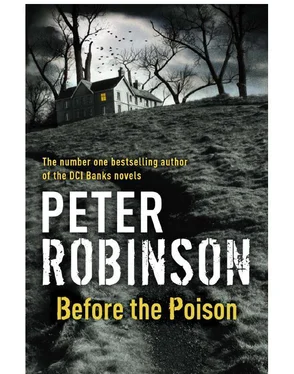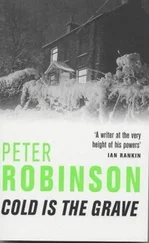Peter Robinson - Before the poison
Здесь есть возможность читать онлайн «Peter Robinson - Before the poison» весь текст электронной книги совершенно бесплатно (целиком полную версию без сокращений). В некоторых случаях можно слушать аудио, скачать через торрент в формате fb2 и присутствует краткое содержание. Жанр: Исторический детектив, на английском языке. Описание произведения, (предисловие) а так же отзывы посетителей доступны на портале библиотеки ЛибКат.
- Название:Before the poison
- Автор:
- Жанр:
- Год:неизвестен
- ISBN:нет данных
- Рейтинг книги:4 / 5. Голосов: 1
-
Избранное:Добавить в избранное
- Отзывы:
-
Ваша оценка:
- 80
- 1
- 2
- 3
- 4
- 5
Before the poison: краткое содержание, описание и аннотация
Предлагаем к чтению аннотацию, описание, краткое содержание или предисловие (зависит от того, что написал сам автор книги «Before the poison»). Если вы не нашли необходимую информацию о книге — напишите в комментариях, мы постараемся отыскать её.
Before the poison — читать онлайн бесплатно полную книгу (весь текст) целиком
Ниже представлен текст книги, разбитый по страницам. Система сохранения места последней прочитанной страницы, позволяет с удобством читать онлайн бесплатно книгу «Before the poison», без необходимости каждый раз заново искать на чём Вы остановились. Поставьте закладку, и сможете в любой момент перейти на страницу, на которой закончили чтение.
Интервал:
Закладка:
Saturday, 14th February, 1942 St Valentine’s Day. Hard to believe it could be such a harbinger of doom. We awoke at dawn to find ourselves at anchor next to the Tien Kwang in the lea of a small island, having sailed through the night to avoid detection. I knew we could not be far away from Singapore, as this old ship does not move very fast. One of the officers we had nursed in the Alexandra Hospital offered Brenda and me a camp bed on the officers’ deck, so we passed a reasonably comfortable night, though it was terribly hot and humid. We have little but the clothes we are wearing, and they are constantly soaked with sweat. Fresh water is strictly rationed. At about eight o’clock this morning, the Japanese aircraft appeared, and suddenly there was an almighty explosion, and smoke and fire burst out everywhere. People were running around the deck screaming, mothers trying to find their children amidst the smoke and chaos, the wounded writhing and screaming in agony, the decks slippery with blood. The SS Kuala was sinking fast, listing to the stern, and I heard a distant voice coming through the chaos, giving the order to abandon ship. I could not find Brenda in the crowds and the oily smoke, so I jumped. We were close to an island, but the currents were flowing in the opposite direction, and I could see people being swept out to sea, helplessly waving their arms and screaming for help, then going under the waves. There was nothing I could do for them. I knew that Brenda was a strong swimmer, and that if she made it off the ship she would have a good chance. The crew tossed lifebelts and everything that would float over the side, and people were clinging to whatever bits and pieces they could find. The lifeboats were full. I swam as strongly as I could against the current. Severed arms and legs bobbed on the water’s surface, along with dead fish, and kept bumping into me as I swam by. Once I saw a woman’s head floating, its eyes bulging. I worried that the sharks might get me, but I realised that they had probably been scared away for the moment by the bombs. The Japanese aircraft attacked again and strafed us in the water with their machine guns. I could never have imagined that anyone could be so cruel. I do not think I have ever hated anyone as much in my life as I hated them at that moment. Didn’t they know we were just defenceless women and children, the wounded and the sick? We were struggling for our lives in shark-infested waters against strong currents, and they were firing their machine guns at us. I was lucky. Like Brenda, I am a strong swimmer. I struggled on and found space in a lifeboat. We rowed hard against the current to the shore. Behind us, we could just see the last of the SS Kuala sinking under the waves. The Tien Kwang was already gone. The shore was too steep and rocky for us to land, so we continued around the island until we were lucky enough to find a beach on the other side. When we got there, I staggered out of the boat on to the sand and collapsed, exhausted. My legs were wobbly, my arms ached and I felt dizzy. I just lay there for a while staring into the burning sky, gasping for breath. It had all happened so quickly, yet it had felt like an eternity, too. I quickly realised that I was half-naked. I had shed most of my outer clothing when I was swimming, to prevent the weight of it from adding to the current’s pull, but I was relieved to feel my oilskin still around my neck. The others from the lifeboat flopped on the sand all around me, many of them bleeding from bullet or shrapnel wounds. There had been about nine hundred people altogether on those two ships, I thought, and I wondered how many were left. I could hear the aircraft continuing to strafe the survivors, but we were on the other side of the island, and I could not see them. That situation did not last long. It was a small island, and the Japanese decided to give us one more bombing before they left. Some of the bombs exploded quite close to us, and afterwards my ears were ringing, and I noticed that I was bleeding from a deep cut on my arm. I tore a strip from what was left of my underwear and used it as a bandage. As soon as I had got my breath back and listened to make sure the aircraft had gone, I got to work and started examining the other survivors around me. One or two were beyond help, but many just had minor wounds or concussions. The poor babies were crying, and some of the little children were wandering around calling for their mothers. After ten or fifteen minutes of trying to create some order out of the chaos, I found Brenda. She was stunned and had a nasty gash on her forehead, which would require stitches, but otherwise she was all right. I hugged her, and she revived quickly enough. She told me that she had clung to a mattress until she came close enough to one of the lifeboats to climb on board. So here we are, marooned on Pompong Island, as one of the Malayan women tells us. With Brenda’s help, I found some more sisters and two doctors, and together we did the best we could for the injured and dying. Brenda thinks there are about five hundred of us on here altogether, which means that we lost almost half our number in the attacks. All we want now is for the Japanese to stay away and let us sleep, but there is still much to be done while the daylight is still with us. Those who have searched already say there is no food on the island and only one small fresh water spring. We are still managing to salvage quite a lot from the ships, including a chest containing some of the crew’s work clothes, though I do not find the seaman’s uniform someone gave me very becoming, and it is far too large for me. Still, it covers up what needs to be covered up, I suppose, and it is better than running around in my knickers, which were all I had left to wear! As far as food is concerned, there is not much but a few tins of bully beef, which will not go far when shared by five hundred people. We have one barrel of water. Short of Jesus coming to perform one of his magic tricks, we do not stand much of a chance of surviving more than a few days. And the Japanese know we are here. As regards medicine and medical equipment, we found a few basic first-aid kits, and that is all. At least I have been able to stitch Brenda’s wound. I read Robinson Crusoe as a child, but I never thought I would find myself in such a situation as he did! I must stop now. There is much to do.
December 2010
There were two numbered music files on the DVD Louise had given me, and I was curious as to what they could be. Assuming my old MacBook had the software necessary to play them, I selected the first one. I heard tinny, distant piano chords that sounded only vaguely familiar, as if from a tune I recognised but was not used to hearing played on a piano. Even though it had probably been cleaned up by the computer software, the recording was still scratchy and sounded faraway, recorded at some distance from the piano.
Then, all of a sudden, came the voice, sounding closer, more intimate, and surprisingly pure. Immediately I knew what it was: ‘ Vissi d’arte, vissi d’amore…’ the famous aria from Puccini’s Tosca. It was Grace singing. It had to be, I knew, even though I had never heard her voice before. She must have gone into one of those make-your-own-recording places, the sort Elvis Presley had used to record ‘My Happiness’ for his mother’s birthday. It would have been acetate, or a 78 rpm pressing, I supposed, and Louise must somehow have transferred it to her computer, then on to the DVD.
When the aria had finished, I played it again and concentrated on the voice. Grace wasn’t a great technical singer. Good, but not great. Her voice was strong and certainly had timbre and character, but ‘ Vissi d’arte ’ has some tough dramatic moments, some powerful high notes to be hit and held. While Grace didn’t always hit them from above – she was a natural mezzo, not a soprano, which the role called for – and while her voice sometimes seemed to strain and tremble over a phrase, she handled most of the song in its dramatic context with great sensitivity and skill, I thought. Interpretation was her forte, along with emotion. ‘I never harmed a living soul. / With secret hand / I helped relieve as much misfortune as I could.’
Читать дальшеИнтервал:
Закладка:
Похожие книги на «Before the poison»
Представляем Вашему вниманию похожие книги на «Before the poison» списком для выбора. Мы отобрали схожую по названию и смыслу литературу в надежде предоставить читателям больше вариантов отыскать новые, интересные, ещё непрочитанные произведения.
Обсуждение, отзывы о книге «Before the poison» и просто собственные мнения читателей. Оставьте ваши комментарии, напишите, что Вы думаете о произведении, его смысле или главных героях. Укажите что конкретно понравилось, а что нет, и почему Вы так считаете.












